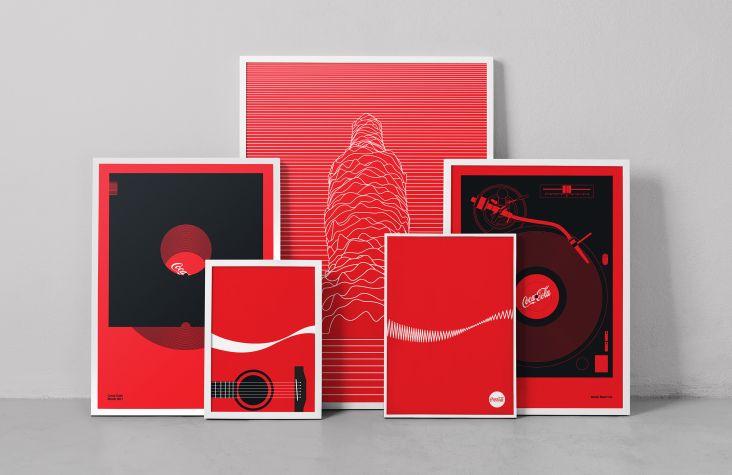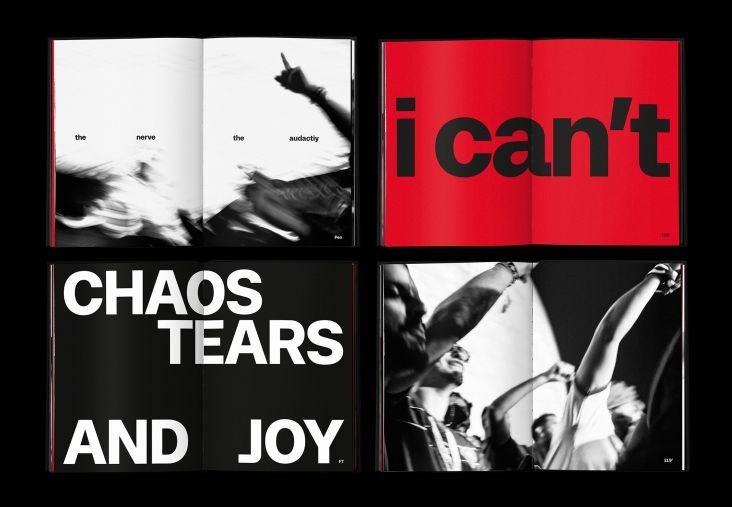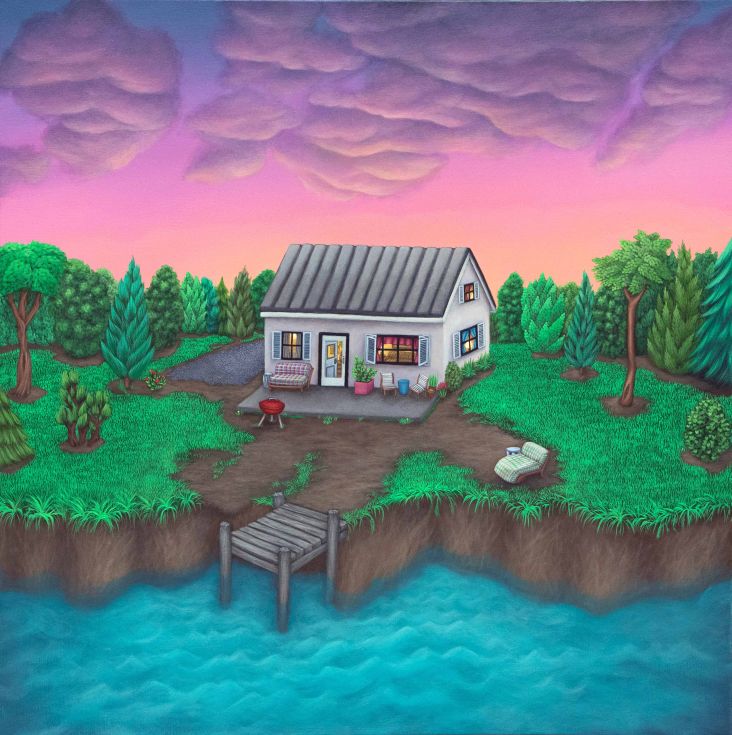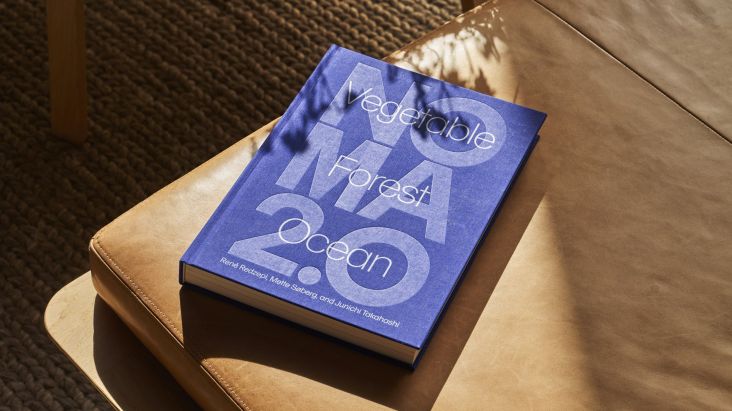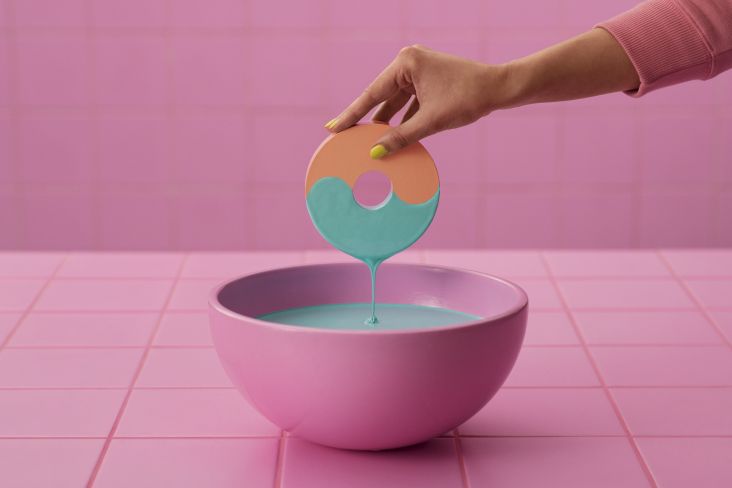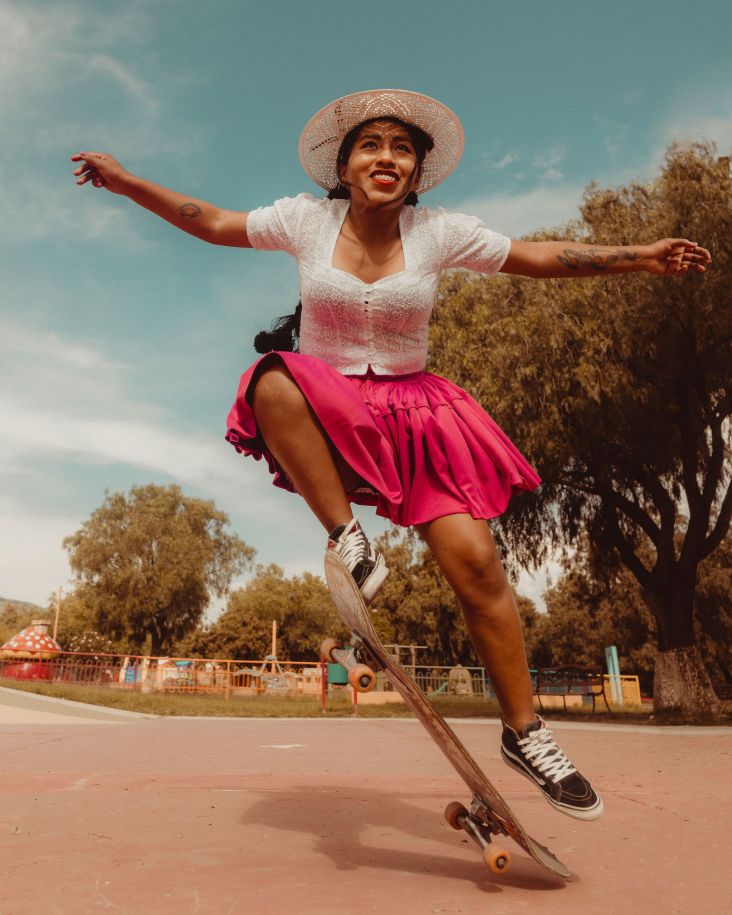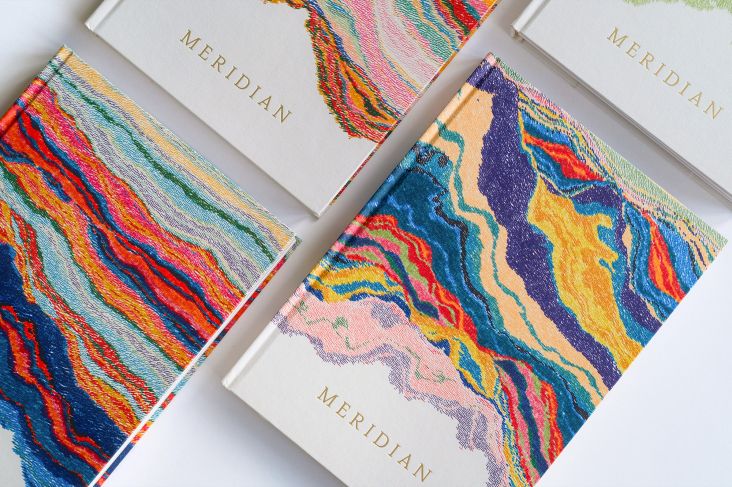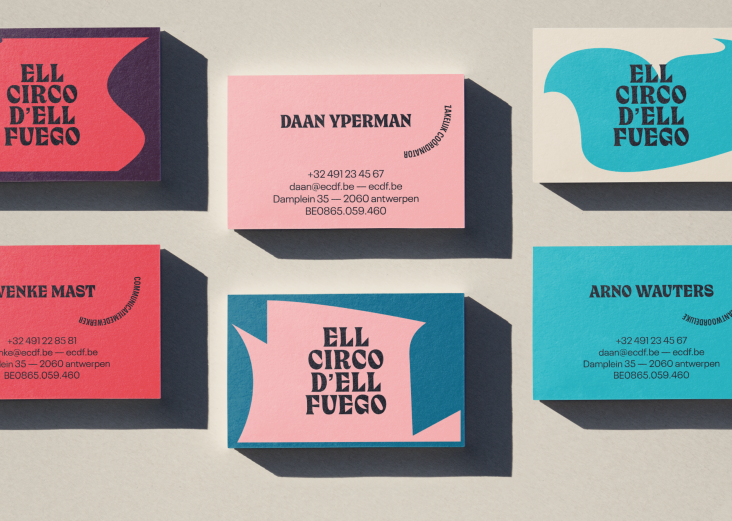Sara Dobson and Rijul Narwal on how a UAL scholarship changed their lives
Many people would love the chance to study at a leading university, but their circumstances mean they just can't afford it. Yet, if you hunt around, it is sometimes possible to break through the cracks by applying for the right scholarship. So we were excited to hear that University of the Arts London (UAL) have three scholarship schemes to support postgraduate students with their studies.
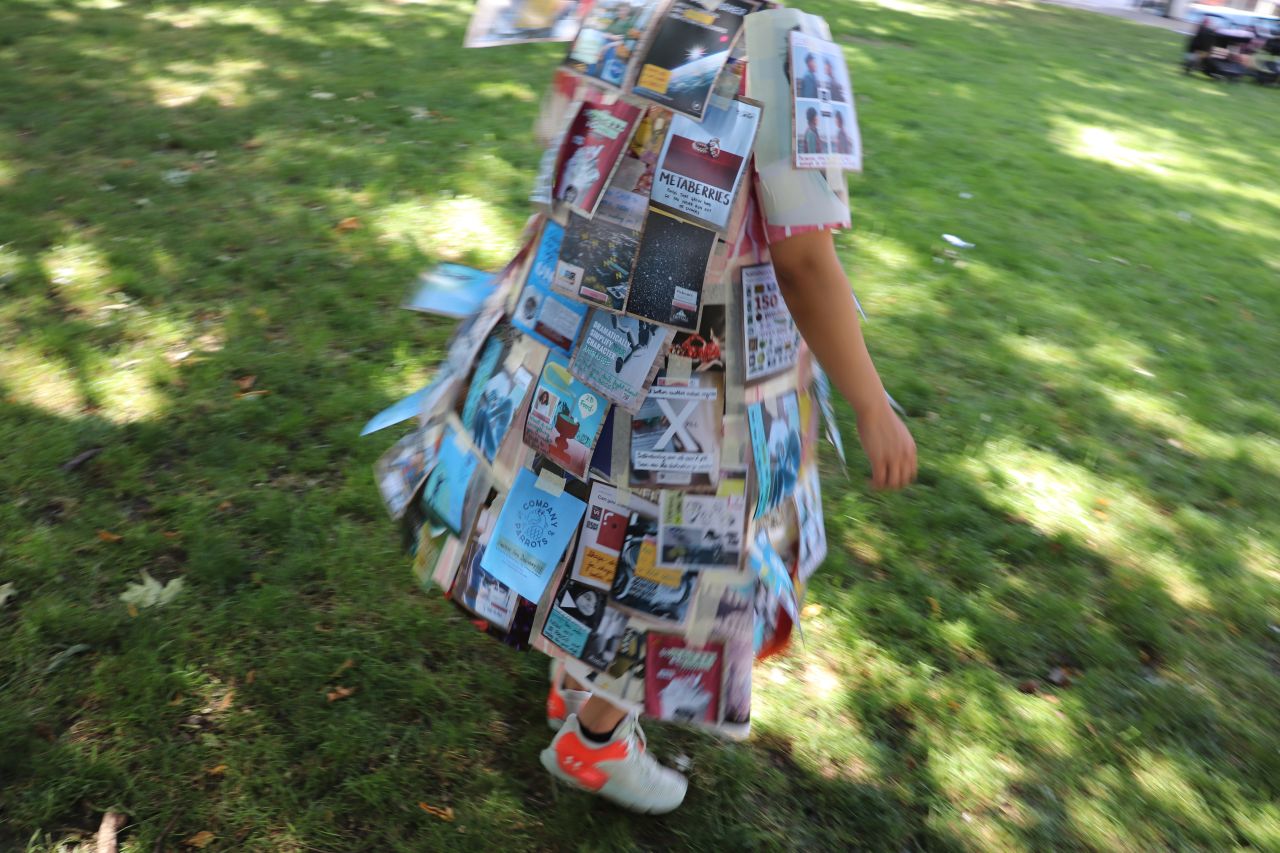
Cloak of Individuality © Rijul Narwal
Here at Creative Boom, we're huge admirers of UAL. It offers courses in art, design, fashion, computing, communication and performing arts across six renowned colleges (Camberwell College of Arts, Central Saint Martins, Chelsea College of Arts, London College of Communication, London College of Fashion and Wimbledon College of Arts) and the Creative Computing Institute. You can read our coverage of some of UAL students' best work here. So it's pretty amazing that students from all over the world have the chance of getting a world-class education here on a scholarship.
The schemes are as follows:
- UAL Home Postgraduate Scholarships provide a £5,000 fee waiver for a full-time, part-time, or online taught Masters course at one of UAL's Colleges and Institutes. There are 185 awards available through two routes with different eligibility criteria.
- UAL International Postgraduate £7,000 Scholarships provide a £7,000 tuition fee waiver for a full-time, part-time or online taught Masters course at one of UAL's Colleges and Institutes. Up to 215 are available.
- UAL International Postgraduate £50,000 scholarship covers the cost of tuition fees for in-person courses and accommodation at one of UAL's halls of residence and may also contribute towards living costs. Up to four are available.
It's easy to think, "People like me never get that kind of luck". But if you fit the criteria, then it's exactly people like you who do. And to demonstrate what that looks like in practice, we sat down with two UAL scholarship students, Sara Dobson and Rijul Narwal, to learn about their journeys and what they've learned from studying at UAL.
Meet the students
Sara Dobson is a British multidisciplinary artist currently studying MA Fine Art: Digital at Central Saint Martins, a course she began in 2022 and will complete in 2024. She worked as a freelance artist and designer for several years, with exhibitions in London and the UK, before being awarded a Fellowship of the Royal Society of Arts in 2018. A multidisciplinary artist, she has a big passion for tech, from film and drone photography to NFTs and using electrical paint on canvas.
Rijul Narwal, from India, completed an MA last year in Design for Social Innovation and Sustainable Futures at London College of Communication. Having completed her BA at the National Institute of Fashion Technology, she has pivoted away from the fashion industry and towards sustainable design.
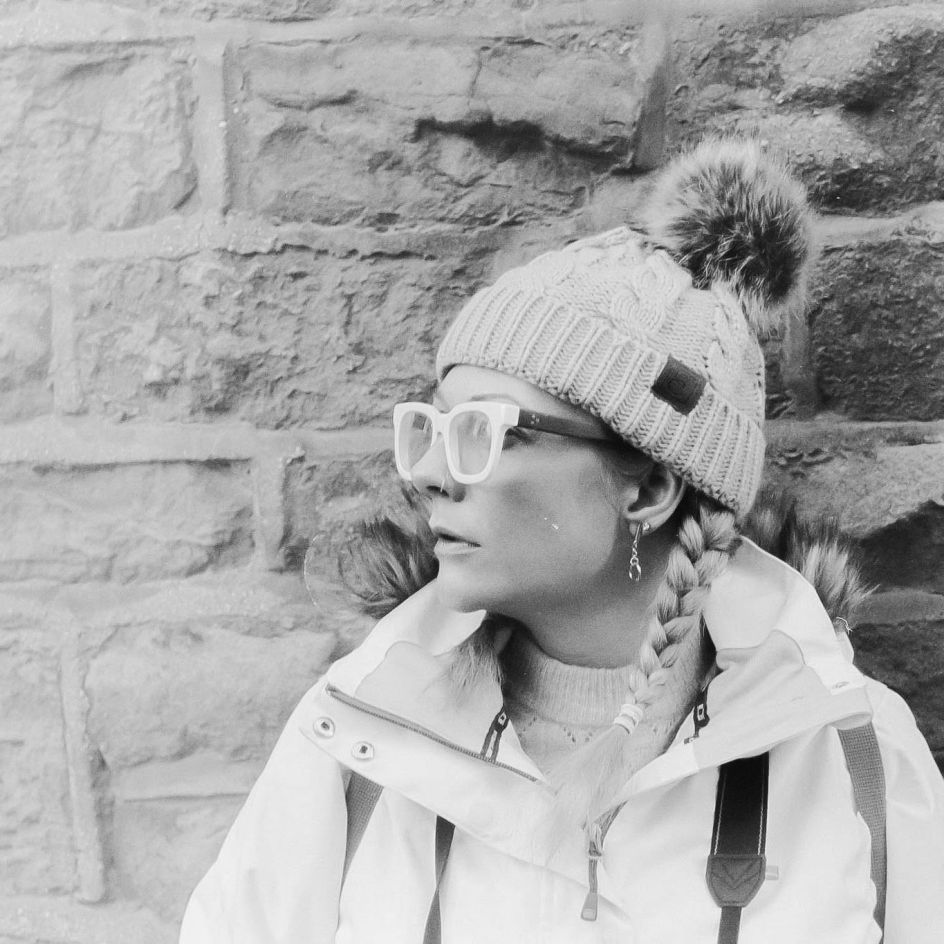
Sara Dobson
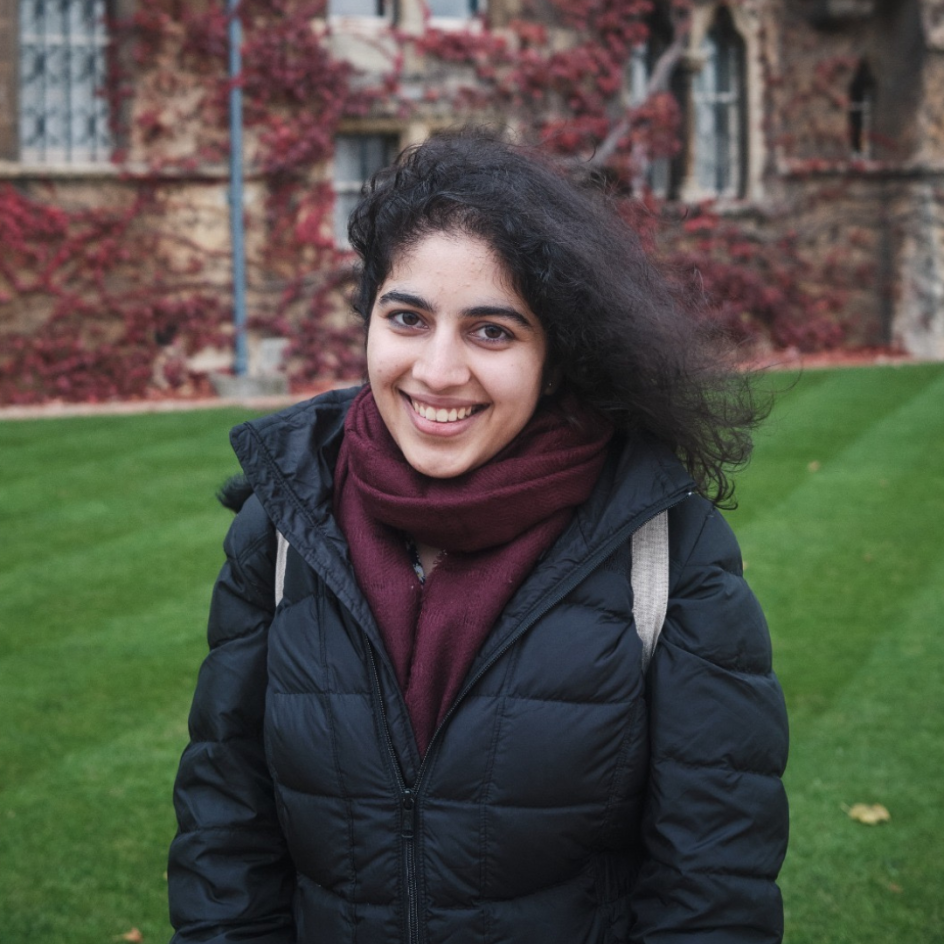
Rijul Narwal
Rijul, how did you get from India to UAL?
Rijul: I did my undergraduate in New Delhi, and as part of that, I studied abroad in New York. Then Covid hit, so I basically completed my undergraduate studies during the pandemic.
I've always been told that I'm very creative. I knew I wanted to get into design, but I wasn't sure what kind. At that time, I was designing lifestyle accessories: products like home products, fashion accessories, bags, and shoes – so I went to New York to specialise in footwear and handbags.
But somewhere along the line, I realised I didn't like the fashion aspect too much. I had like an incident where I thought, I want to make shoes out of scrap leather. And someone told me: why are you wasting so much time collecting scraps when you can just tear up like a full leather skin and say these are scraps? And I thought, if the industry is like this, I don't think I want to get into it.
So I was looking for something new and came across the UAL course, Design for Social Innovation and Sustainable Futures.
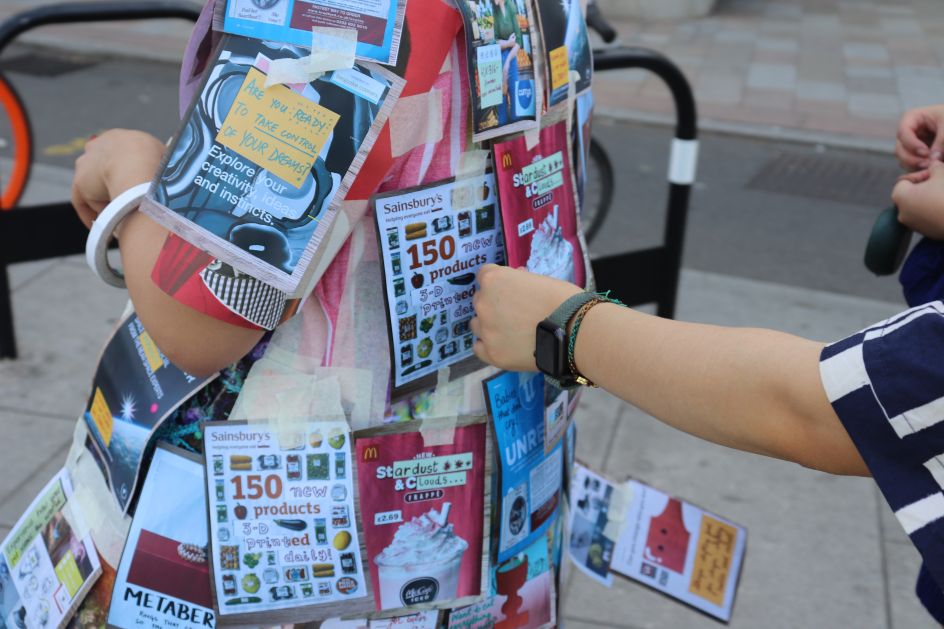
Cloak of Individuality © Rijul Narwal
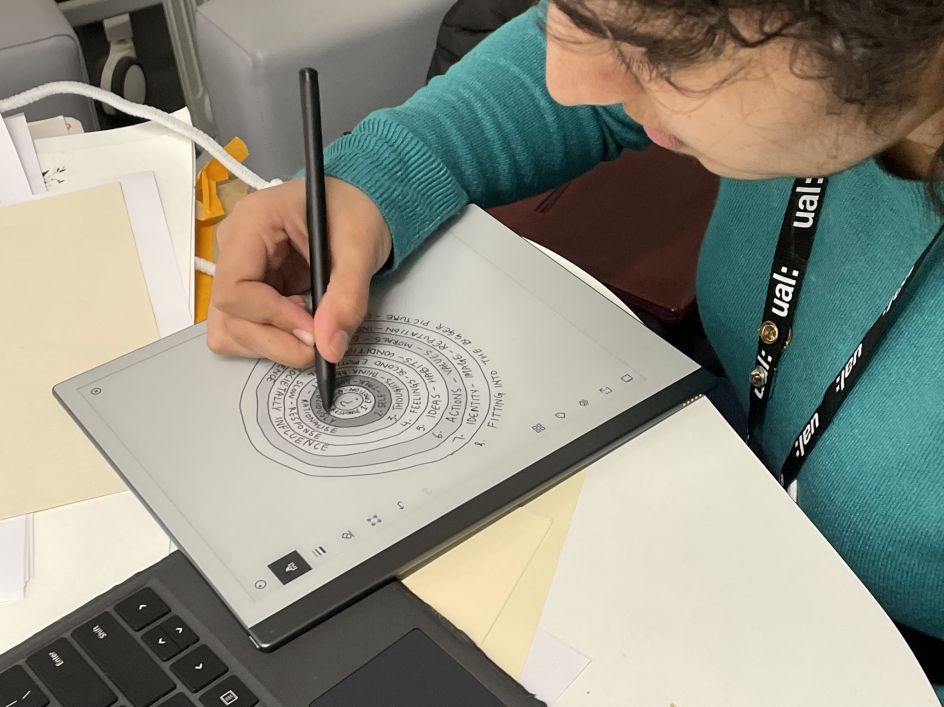
The process © Rijul Narwal
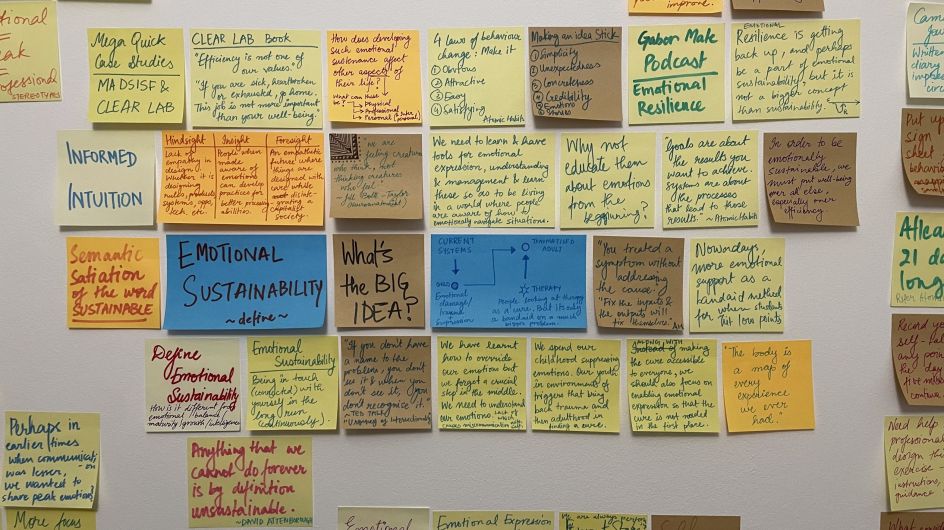
The process © Rijul Narwal
What stood out to you about UAL?
What stood out to me was that the course was not fixed. It's not saying you know you're a product, fashion, or graphic designer. It's just about getting a skill set.
The course told us how to approach a situation and how to approach a brief: so we got a set of skills and a set of values and were able to apply them to any sort of project. There was no limitation that this was all you could do. And I think that's what appealed the most.
Sara, your story's a little different, right?
Sara: Yes, my art practice began, I suppose, when I was a child. It was an outlet because I was going through many difficulties. My father was very unwell and passed away when I was 12. I ended up going into state care. I was in foster care for several years, which affected my education. So although I was kind of a high achiever and got into a grammar school, things were difficult, and I had to leave.
All the while, my art was always there in the background as an outlet. When I say art, I mean music, visual arts, poetry, and various multidisciplinary things. But nobody ever helped me to focus on that or gave me direction. So I ended up going down a more academic route, and despite numerous adversities, I eventually did my undergrad in sociology and history at Lancaster University.
I got a first-class degree, and everything seemed to fall into place. And then, I got an offer from Oxford to do my Masters. It was a dream come true. I thought: 'Oh, my dad would be so proud'. But I couldn't afford to go because of my background. It was a strange situation to be in. The former home secretary Jack Straw, who lives near me, tried to help, but it didn't work. So I ended up taking some kind of an academic break.
I carried on down the sociology route. But all the while, I always kept my hand in art. And then, just before the pandemic, I thought, 'You know what? I want to focus on this a lot more.' And once I started to put my work out there to a wider audience, it was very well received. I was awarded a Fellowship at the Royal Society of Arts in 2018.
And that was without any formal art education?
Right. And then, I had many successes with competitions, exhibitions, and various things. So then I started thinking about my future academically. I'd originally thought, 'What kind of art college will take me?' But then I came across the UAL and Central Saint Martins, and it absolutely lit me up when I read about the course.
I'm doing an MA in Fine Art Digital, which is a remote course. Which meant I could be at one of the best art colleges in the world. And they were so accepting and welcoming.
As Rijul says, the idea is to provide a skill set, and it's not focused on one specific area. So where I was worried that my work was quite sporadic and multidisciplinary because I enjoy many different art forms and mediums, and they embraced that.
The application process was a challenge because I didn't have a huge amount of work to show. Most of my stuff was just scribbles and scraps and things because I didn't have any portfolio. But I put what I had together with some films I'd done and was accepted onto the course.
How did you hear about the scholarship?
Rijul: One of my friends had done her Masters from UAL the year before and pointed me toward the scholarships. And, as far as I remember, they had a few prompts when we were applying. They asked direct questions such as: how will this scholarship benefit you? How is it going to help you on the course? And I just poured my heart out.
Sara: The actual scholarship application was a relatively straightforward process for me. As Rijul says, you have to demonstrate how you meet the criteria and how it would benefit you. I come from a lower socioeconomic background; I was the first in my family to attend university. I also have epilepsy, ADHD and autism. So I have a few conditions.
I just want to mention that whilst the scholarship system is separate from student services or the departments, they were so helpful. I couldn't thank them enough for directing, helping, and telling me what was available. It was better than anything I'd experienced previously because of the way that the departments at UAL communicate with each other.
What's the course at UAL been like?
Sara: Because it's a remote course, its delivery and dynamic are very different to a traditional course. And a lot of it is very much self-led. The onus is on the students to develop an independent enquiry and articulate their goal and how they hope to achieve it. And so, a large part of the assessment process is the journey and the process of getting from A to B. And that is something that I'm fascinated by.
We have weekly, live lectures on Zoom. But if you can't make it for whatever reason because of other commitments, then it is recorded. We have an upcoming residency in London where a few of us will be coming down from the first and second year to take clients and collaborative workshops and things like that.
During the course, I've been drawing from my background and my interests and passions in the social sciences, and I've been looking at neurodiversity because that's something close to my heart. The stigma behind that and how we can use art as a medium to represent that and raise awareness and help bridge many of our problems.
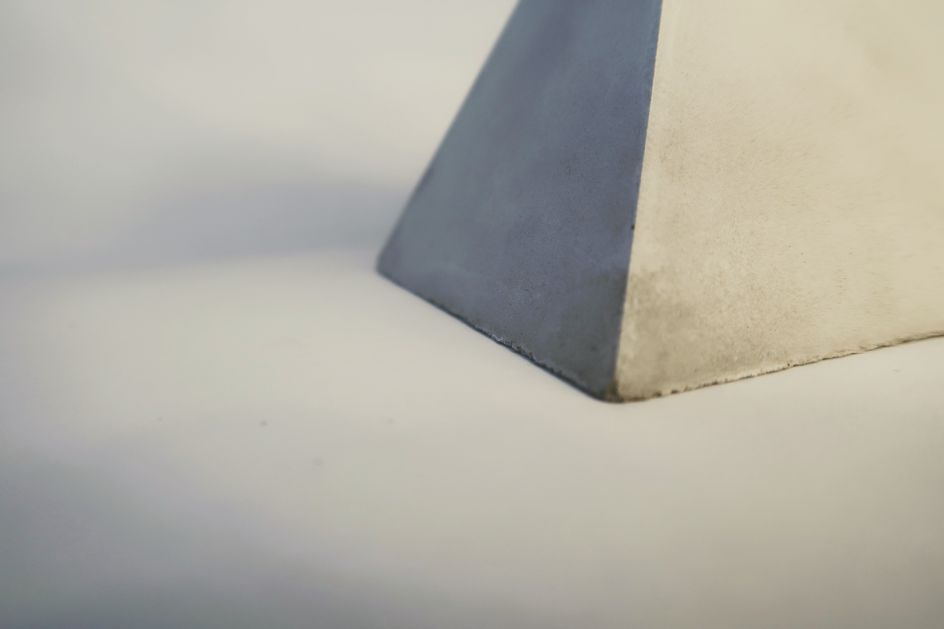
Hear Me Raw. Pt1 © Sara Dobson
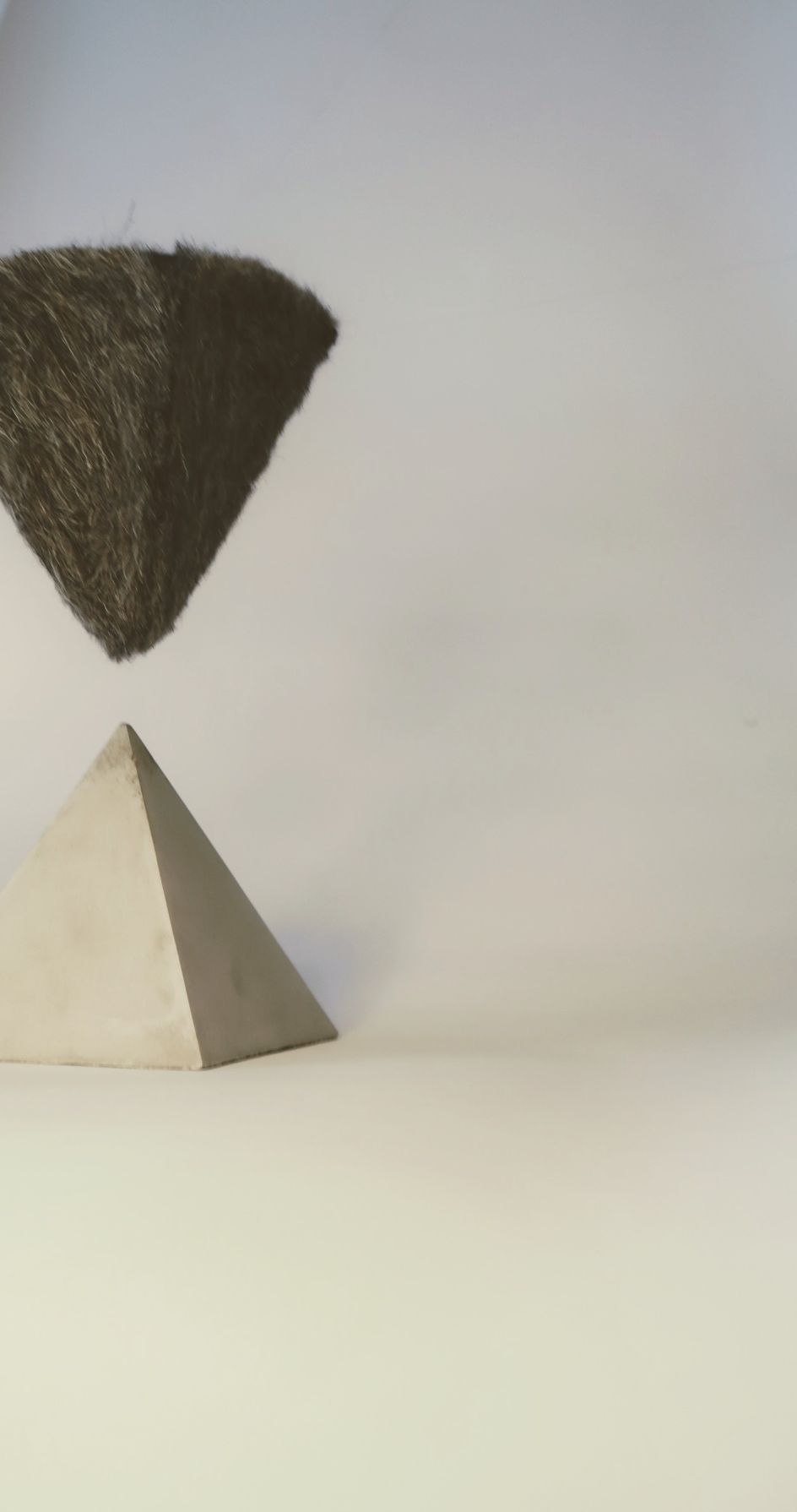
Hear Me Raw. Pt1 © Sara Dobson
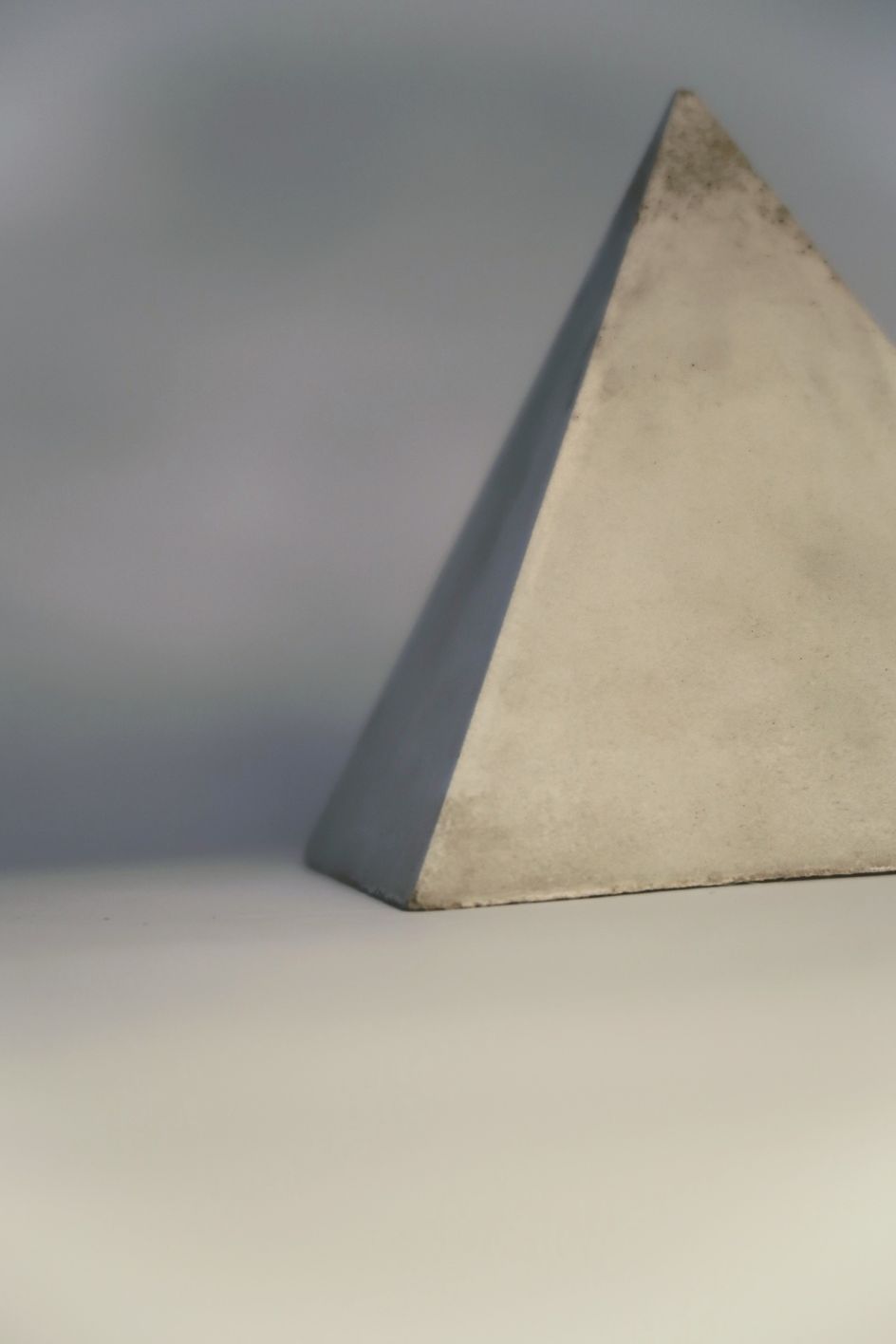
Hear Me Raw. Pt1 © Sara Dobson
I've been looking at the materials I use just in front of me. I opt for concrete and natural materials like felted wool to represent the labelling theory of how we put ourselves into boxes. The interim show is coming up in a couple of weeks, and that will be a chance for me and the rest of the group to showcase our work in progress. And I'm very excited about that.
Rijul: Like Sara, I enjoyed that my course projects were self-initiated and open-ended. The highlight for me was my final major project, which was titled Emotional Sustainability. Juxtaposing those two words got a lot of attention! It looks at the current pitfalls hindering emotional expression and focuses on bridging these gaps, aiming to contextualise emotions to decolonise well-being. To do so, the project developed three interventions: illustrations highlighting key issues, an emotional first-aid tool and prompt cards for designers.
What have you got out of the course as a whole?
Rijul: The biggest thing I got out of the course was an understanding of my connection to the things I do. There was a lot of focus on positionality: what's your connection to the topic? Who are you engaging in the project, and why?
I never had that learning previously. Previously it was always: this is how things are done, and your project should fit into this polished framework. It is the start, the inspiration, that sort of thing. Whereas at UAL, it was much more flexible.
Sara: Also, I'd say that indirectly the course has opened up many more opportunities that have helped to expand my interests. I've networked and collaborated with people in organisations that I wouldn't have necessarily thought of. I've already participated in the Creative Hack at the College of Fashion. Plus, I was elected as an online ambassador. It's just been a bit of a whirlwind, but overall, I feel like it's propelled my work and I'm very excited about where this will go.
Would you recommend applying for a scholarship at UAL?
Rijul: Definitely, yes. Especially with UAL. It's been the first time I've had that community where I've been with like-minded people. We still catch up with each other today.
Sara: Without hesitation, 100%. If you meet the criteria, I'd say apply for any of the courses that would be relevant to you. I don't want to sound overdramatic, but it's been life-changing. And it gets me quite emotional, actually – because I'm coming from a situation where I couldn't go to Oxford because of a lack of funding. But UAL has been so welcoming and so inclusive.
Apply for a scholarship at UAL!
Want to change your life by pursuing the kind of work you're truly passionate about? University of the Arts London (UAL) can help make it happen.
UAL offers a wide range of postgraduate courses, covering areas including 3D and product design; animation, computing, film and sound; architecture, spatial and interior design; communication and graphic design; fine art and illustration; design for theatre and screen; fashion design, textiles and materials; photography, and more. Check out the complete list of postgraduate courses here.
If you're interested in completing a course remotely like Sara, UAL's online postgraduate courses give you the opportunity to study at a leading creative university without having to move or commute to London. Find out more about the online postgraduate courses available at UAL here.
If you meet the criteria, you can even apply for help with funding via a UAL scholarship. Learn more and apply for a scholarship here.





 by Tüpokompanii](https://www.creativeboom.com/upload/articles/58/58684538770fb5b428dc1882f7a732f153500153_732.jpg)

 using <a href="https://www.ohnotype.co/fonts/obviously" target="_blank">Obviously</a> by Oh No Type Co., Art Director, Brand & Creative—Spotify](https://www.creativeboom.com/upload/articles/6e/6ed31eddc26fa563f213fc76d6993dab9231ffe4_732.jpg)









